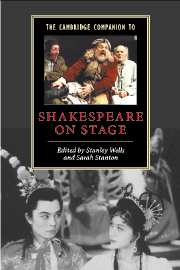Book contents
- Frontmatter
- 1 Shakespeare plays on Renaissance stages
- 2 Improving Shakespeare: from the Restoration to Garrick
- 3 Romantic Shakespeare
- 4 Pictorial Shakespeare
- 5 Reconstructive Shakespeare: reproducing Elizabethan and Jacobean stages
- 6 Twentieth-century performance: the Stratford and London companies
- 7 The tragic actor and Shakespeare
- 8 The comic actor and Shakespeare
- 9 Women and Shakespearean performance
- 10 International Shakespeare
- 11 Touring Shakespeare
- 12 Shakespeare on the political stage in the twentieth century
- 13 Shakespeare in North America
- 14 Shakespeare on the stages of Asia
- 15 Shakespeare and Africa
- Further reading
- Index
3 - Romantic Shakespeare
Published online by Cambridge University Press: 28 May 2006
- Frontmatter
- 1 Shakespeare plays on Renaissance stages
- 2 Improving Shakespeare: from the Restoration to Garrick
- 3 Romantic Shakespeare
- 4 Pictorial Shakespeare
- 5 Reconstructive Shakespeare: reproducing Elizabethan and Jacobean stages
- 6 Twentieth-century performance: the Stratford and London companies
- 7 The tragic actor and Shakespeare
- 8 The comic actor and Shakespeare
- 9 Women and Shakespearean performance
- 10 International Shakespeare
- 11 Touring Shakespeare
- 12 Shakespeare on the political stage in the twentieth century
- 13 Shakespeare in North America
- 14 Shakespeare on the stages of Asia
- 15 Shakespeare and Africa
- Further reading
- Index
Summary
Performing Shakespeare in the Romantic age became an intensely political business. The leading theatre critics – William Hazlitt, Charles Lamb, and Leigh Hunt – pepper their dramatic interpretations with deft, savvy and mischievous political shots. Reviews make frequent and pointed references to controversial topical events (the disorder which broke out after the mass meeting organised by radical leaders at Spa Fields in 1816, for instance, or the government's decision in February 1817 to suspend habeas corpus, thereby removing the accepted civil liberties of the English people); political concepts and institutions – anarchy, monarchy and aristocracy – pervade the discussion of Shakespearean performance. What is at stake in these accusations and counter-accusations, sly asides and ironic tirades? Why should the discussion of Isabella's chastity, or Coriolanus's condescension towards a Roman mob provoke charges of sedition and libel? At the heart of this period is a battle for the political and moral possession of Shakespeare.
Do Shakespeare’s plays celebrate monarchy and aristocratic government? Or might these dramas offer a much more ambivalent interpretation of political power and moral values? Is Shakespeare a natural aristocrat, or a closet radical? In the early nineteenth century, performers, managers and theatre critics relished the chance to offer polemical answers to these controversial questions, for in Shakespeare’s representations of political power seemed to lie the key to Britain’s political future.
- Type
- Chapter
- Information
- The Cambridge Companion to Shakespeare on Stage , pp. 37 - 57Publisher: Cambridge University PressPrint publication year: 2002
- 2
- Cited by



